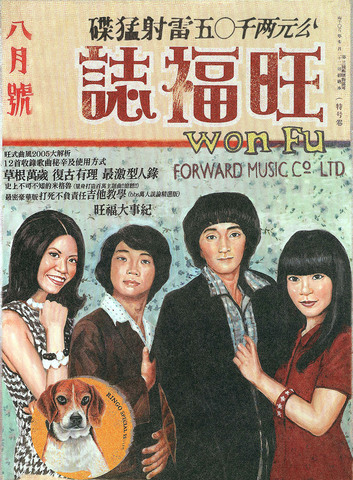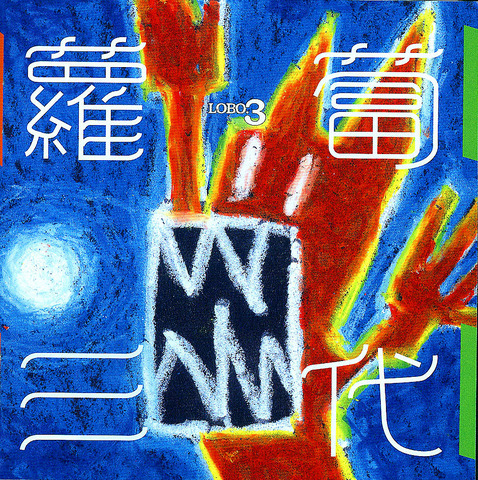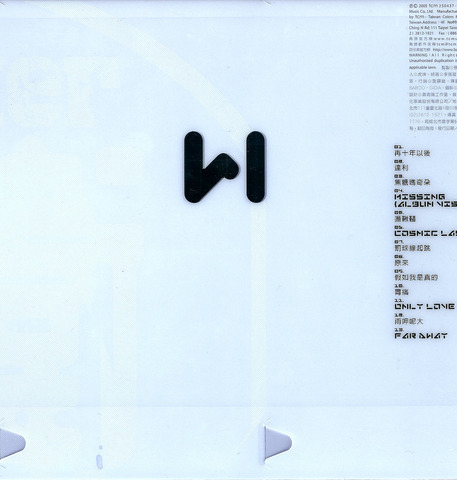Taiwan's favorite variety show host and master of the natty one-liner, Chang Fei (張菲) returns to record store shelves this month with his second English-language release, Romance.
The album picks up from where his 2004 debut English-language release When I Fall in Love left off and once again sees the loathed and loved all-round entertainer tackling a myriad of classic romantic lounge tunes.
While Chang tried very hard to pass himself off as Taiwan's answer to Vic Damone on last year's release he has thankfully ditched the pretense this time around. Chang instead sticks to sounding like, well, himself and the result is quite pleasing.

OK, it's not brilliant, but you can't help but be charmed by Chang's crooning capability. This is especially true on the album's opener, the wonderful cover version of Giovanni Capurro's classic 'O Sole Mio, which will leave even the most cynical of unromantic of individuals looking for love.
Sadly Chang's rather wobbly command of the English language still lets him down on occasion, but for the most part the material on Romance is a step above the tunes he warbled his way through last year. Regardless of Chang's linguistics faults, those with a whim for romantic lounge music will find the album worthwhile, as the material is all great sing-a-long stuff and the tunes are guaranteed to leave not a dry eye in the house.
Chang hits all the right notes and listeners can't help but be impressed by his renditions of numbers like Al Hoffmann's Papa Loves Mambo, Willie Nelson's Crazy, Edith Piaf's La Vie en Rose, Cole Porter's I've Got You Under My Skin and Tom Jones' My Cup Runneth Over.

The highlight of the whole affair, however, is Chang's spotless cover version of Riz Ortolani and Marcello Ciorciolini's love-loaded lounge classic, More. The brass section and orchestration are both spot on and the tune brings out the best in Chang's versatile vocal chords.
The Records of Won Fu (
The album's tunes are tight, well-produced and, in what has become typical Won Fu fashion, packed with an eclectic mix of uplifting jangle/bubble-gum-pop hooks and riffs and, of course, large amounts of tongue-in-cheek wit and retro chic.

Like all Won Fu releases, the band opts to mix it up with a wide range of genres and styles. And while the crux of the album revolves around cutesy jangle pop, the combo still makes time to throw in a few contrasting and pleasing musical curve balls.
Kicking in with the bouncy pseudo-country number Ringo, which even if you're not familiar with Won Fu you might have heard on TV as the backing track for the MP3 Agogo commercial, the album takes listeners on a hurdy-gurdy ride that sees the combo poking rhythmical fun at and waxing lyrical about a crazy assortment of subject matter.
Be it a bubbly and playful love song, a slow folksy tune, a jerky retro take on bee-bop or a polka-based and inanely comedic tune about a little fish, Won Fu never misses a beat and comes up trumps time and time again.

It's not all jangle-pop, as The Records of Won Fu includes a couple of rudimentary slices of buzzsaw-guitar-loaded power-pop. With gnarly punk-oriented guitar riffs and a heavy reliance on drum and bass, The Aspirations of Ah-Liang (
Formed in 1993, four-piece rock outfit Back Quarter (四分衛) has never managed to reach the same level of popularity as many of its indie-rock peers that sprung up during Taiwan's alt-music revolution of the early 1990s.
While bands like The Chairman (董事長樂團), The Clippers (夾子) and of course one-time gnarly gay-rights activist rockers turned mainstream pop idols, May Day (五月天) -- all of whom debuted alongside Back Quarter on the 1998 Local Records release Ai Guo Collection (ㄞ國歌曲) -- have gone on to bigger and better things, poor old Back Quarter has been pretty much ignored by the masses.
This probably has a lot to do with the fact that the combo is hard to tie down musically. The band's varied musical repertoire has chopped and changed a bit over the years.
In its early days it was very much a Stiff Little Fingers-like garage band, but over the years Back Quarter has toyed with everything from mainstream pop to hard-hitting heavy rock. All of which no doubt left many would-be fans at a loss as to what to expect from the four-piece next.
W is only Back Quarter's third album and, while it includes a few slow mainstream Mando-pop/rock numbers, a majority of the tunes are hard-hitting guitar-heavy numbers. The album blasts in with the scorching and breakneck Ten Years On (再十年以後), which, while a lot heavier than most Back Quarter tunes, still makes for
great listening.
What follows is mix of styles and sounds. Tunes like Dali (達利) and Missing see the band explo-ring more mainstream Mando musical themes, while on numbers like Caramel Macchiatto (焦糖瑪奇朵), Cosmic Lady and Indigestion (胃痛) Back Quarter do what they do best and expertly employ both lead and rhythm guitars to create an unparalleled wall of sound.
The albums finest moment, however, is the brilliant Only Love on which the band's guitars clash in an almost operatic manner to create a tune that will no doubt prove to be a real crowd pleaser where and whenever the band takes to the stage.
Released last month the third installment of local indie label White Wabbits' continuing promotion of unsigned alternative/indie-rock combos, Lobo 3 features a smorgasbord of styles and sounds by underground bands from Taiwan, Hong Kong, South Korea and Japan.
As a compilation album there are of course a few duds, but on the whole the material and acts featured on Lobo 3 are a great deal tighter and better produced than the material that has appeared on previous White Wabbit Lobo
compilations.
Featuring 24 bands and divided into female- and male-led bands, the musical genres explored are vast and varied. Be it post rock, prog rock, punk rock, downbeat, folk or even orchestrated acoustic moments Lobo 3 has a bit of
everything.
If you're not familiar with the local alternative/indie-music scene, but fancy getting an earful of Taiwan's headlining bands of the future, then Lobo 3 is a pretty good place to start. Some of the album's better tunes include Hindsight's 20/20 (光景消逝), a Jimmy Eat World-like piece of power pop The Eyes Contact, SMOL's jerky post-rock number Question, and Murmur's early Pavement-like The Sorrow of Young Wanker.
Equally engrossing are Cocomu's (可可幕之春) hypnotic and childlike instrumental Game Over, Microcosmos' (小宇宙) prog-rock inspired dreamy number Flying Through the Cosmos (穿梭宇宙) and Hey Punk Rock Girl by Taiwan's fiery all-female punk combo BB Bomb (BB彈).
If the material on Lobo 3 is a sign of things to come, then Lobo 4/5 should prove worth waiting for and well worth checking out.

June 2 to June 8 Taiwan’s woodcutters believe that if they see even one speck of red in their cooked rice, no matter how small, an accident is going to happen. Peng Chin-tian (彭錦田) swears that this has proven to be true at every stop during his decades-long career in the logging industry. Along with mining, timber harvesting was once considered the most dangerous profession in Taiwan. Not only were mishaps common during all stages of processing, it was difficult to transport the injured to get medical treatment. Many died during the arduous journey. Peng recounts some of his accidents in

“Why does Taiwan identity decline?”a group of researchers lead by University of Nevada political scientist Austin Wang (王宏恩) asked in a recent paper. After all, it is not difficult to explain the rise in Taiwanese identity after the early 1990s. But no model predicted its decline during the 2016-2018 period, they say. After testing various alternative explanations, Wang et al argue that the fall-off in Taiwanese identity during that period is related to voter hedging based on the performance of the Democratic Progressive Party (DPP). Since the DPP is perceived as the guardian of Taiwan identity, when it performs well,

A short walk beneath the dense Amazon canopy, the forest abruptly opens up. Fallen logs are rotting, the trees grow sparser and the temperature rises in places sunlight hits the ground. This is what 24 years of severe drought looks like in the world’s largest rainforest. But this patch of degraded forest, about the size of a soccer field, is a scientific experiment. Launched in 2000 by Brazilian and British scientists, Esecaflor — short for “Forest Drought Study Project” in Portuguese — set out to simulate a future in which the changing climate could deplete the Amazon of rainfall. It is

Artifacts found at archeological sites in France and Spain along the Bay of Biscay shoreline show that humans have been crafting tools from whale bones since more than 20,000 years ago, illustrating anew the resourcefulness of prehistoric people. The tools, primarily hunting implements such as projectile points, were fashioned from the bones of at least five species of large whales, the researchers said. Bones from sperm whales were the most abundant, followed by fin whales, gray whales, right or bowhead whales — two species indistinguishable with the analytical method used in the study — and blue whales. With seafaring capabilities by humans